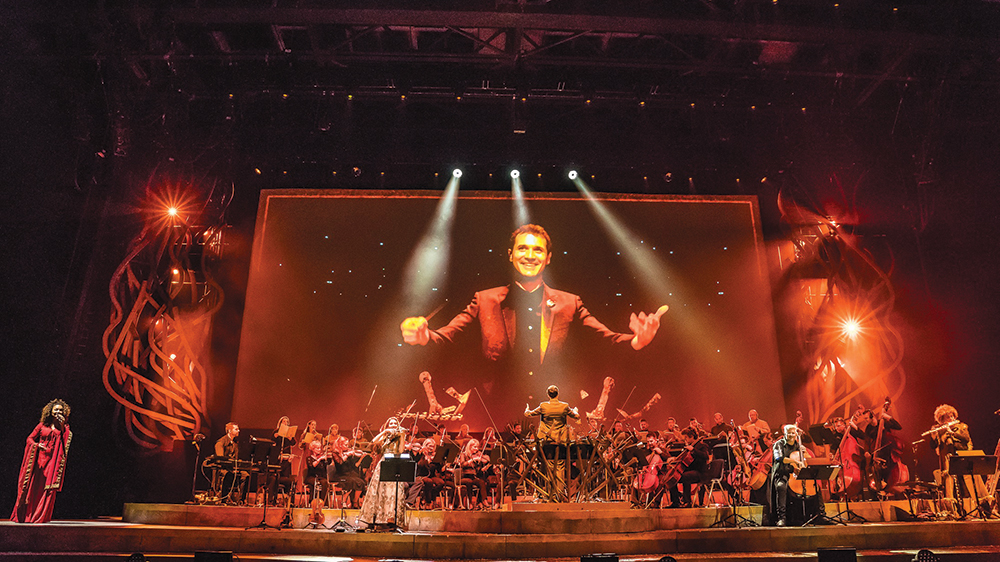Emmys: Dramatic Scores Set Tones and Enhance Stories Across Genre Series
By Jon Burlingame
LOS ANGELES (Variety.com) – The 2018 Emmy nominees for music composition for a series, original dramatic score, could hardly be more diverse: the grim cliffhanger episode of a popular cable serial; a small-combo score for a Marvel Comics heroine; the series finale of a fantasy based on Disney characters; an internationally flavored episode of a freshman broadcast series; an animated “Star Wars” spinoff; and Eastern colors for a cable series that imagines a world of sword-wielding warriors. What they all have in common, though, is how they enhanced complicated tales with emotional melodies.
Game of Thrones
HBO
Composer Ramin Djawadi received two nominations this year, his fifth and sixth noms since 2006. One was for “The Dragon and the Wolf,” the seventh-season finale for the HBO juggernaut, which included musical payoffs for themes hinted at earlier in the season: a love theme for Jon and Daenerys, and a horrifying march for the Army of the Dead.
“Over the seasons, I’ve enjoyed planting themes and then developing them further,” Djawadi says. “And usually in the last episode, I’m able to bring the main theme back in different arrangements” — in this case, a quiet, elegiac choral version that may hint at the death and destruction still ahead.
Marvel’s Jessica Jones
Netflix
Sean Callery, who won a 2016 Emmy for his “Jessica Jones” theme, is up for the final episode of its second season on Netflix, “AKA Playground.” “It was a much darker story this year, as the mother-daughter relationship evolves to a healing place, but then comes to this emotional and tragic conclusion,” he says.
The music, Callery adds, “has to feel very alive and human,” so he performs most of the instruments himself, including piano, guitar, acoustic bass and drums. “I was a classical pianist who played jazz on weekends in college. This was an opportunity to return to more improvisational forms, but it had to be structured to work as a score.”
ABC
ABC’s fantasy series turned out to be the longest gig that composer Mark Isham ever had. The veteran film composer (“A River
Runs Through It,” “42”) scored all 147 episodes over seven seasons, but the workload — “25 to 30 minutes of original custom music every week” — required a team approach. Two of his longtime assistants and later collaborators, Cindy O’Connor and Michael Simon, are co-credited with the score for the nominated series finale, “Leaving Storybrooke.”
The episode, in which many of the key characters returned for an emotional conclusion to the fairytale saga, “took a little thought,” Isham says. “You want to give the emotions their own moment without overcrowding it where every other bar is a quote from another theme.” He scored the entire series with a 27-piece Los Angeles orchestra, expanded to 34 players for the series finale. “Snow White, Prince Charming, these are iconic Disney characters,” Isham points out. “It needs that traditional sound, the real warmth and heart that only an orchestra can provide.”
CBS
The CBS Navy SEAL freshman drama scored an Emmy nom for composers W.G. Snuffy Walden and A. Patrick Rose for the “Pattern of Life” episode that takes place almost entirely in the house of a suspected Yemeni terrorist. Because of the setting, they felt they needed “to bring some of the flavor of Yemen while still maintaining the sound we established for the show,” Rose says.
“It was unique in the series — there were no battles, but the emotional stakes were quite high,” Rose says of the episode, in which a teenager is seriously wounded while the SEAL team interrogates her parents. The composers brought in a vocalist who specialized in “ethnic chants and vocalizations,” added a cellist (on both classic and electric cello) and a guitarist who performed on such Middle Eastern stringed instruments as oud, bouzouki and saz, to enhance the tension.
Star Wars Rebels
Disney XD
Composer Kevin Kiner has been roaming the animated “Star Wars” universe for more than a decade, first scoring six seasons of “The Clone Wars” and then four more seasons of “,” at last earning a primetime Emmy nomination for the final episode of “Rebels,” entitled “Family Reunion — and Farewell.”
While most of the music is his, he does quote occasionally from John Williams’ movie scores and he has adapted the Williams’ symphonic style for much of his work. “I have studied John’s music since 1984,” Kiner says. “There’s a sense of classicism that he brings to that universe.” Kiner used the 80-piece City of Prague orchestra for his score, and was himself one of the singers in the choral segments.
Westworld
HBO
Djawadi’s second nomination was for the Shogun World episode of the HBO sci-fi western, “Akane No Mai.” His work began before shooting, writing dance music for a 19th-century geisha. “That always excites me, when there are new cultures and new instruments to explore,” Djawadi says. He used the traditional shakuhachi flute, taiko drums and the stringed shamisen and koto instruments in both the dance music and his underscore.
“I had a lot of fun breaking out from what we set up last year with the electronic music and the Western sounds,” he adds. “I also rearranged ‘Paint It Black,’” referring to the Rolling Stones song he adapted last year for the park, “to show how the parks are programmed with similar music but stylistically adapted to each world.”

